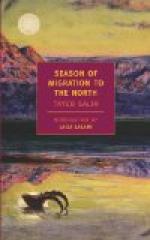Spring up here is but a flutter of invisible garments; even when one is saying “Spring,” full-blown summer is hot afoot. In high noon, in the open places, pools of water form in the ice. With glee is hailed the honk of the first wild goose, the coats of ptarmigan and rabbit thin and darken. There is water on the trail of the kit-fox. The subsidiary streams that feed the Mackenzie fill their banks and flush the rotting ice. With a crash, the drift-logs, with pan-ice and floating islands and all the gathered debris, roll headlong to the frozen ocean.
Do we wonder that Indians worship the great forces of Nature? Gloomy and wide-reaching between her banks of tamarack and spruce, now opening into a lake expansion, here narrowing between her stony ramparts, but ever hurrying on and on and on to that far ocean of ice, the Mackenzie has always been good to her own, the self-contained and silent people along her banks. In this vast land men speak not of bread as the staff of life; their unvoiced prayer is, “Give us our fish in due season.” From the waters of this river, since man was, have the Indians drawn and dipped and seined their sustenance—inconnu, jack-fish, grayling, white-fish, and loche. The wide bosom of the Mackenzie, in winter’s ice or summer’s spate, forever has been the people’s highway—a trail worn smooth by sled-runner and moccasin in the ice-season, melting its breast in the spring-time to open a way to the questing bow of the birch-bark.
Along these banks, forgotten tepee-poles, deserted fish-stage, and lonely grave remain, a crumbling commentary of yesterday, a hint of recurring to-morrows. Son succeeds father, race replaces race, but the great Mackenzie flows on, and, as it flows, unwritten history along these banks is ever in the making. Tragedy and triumph, self-aggrandisement and self-obliteration, are here as well as in the noisy world we have left. Lessons these are for us, too, if we bring the keen eye and listening ear. Among Mackenzie tribes no Yellow-Knife, Dog-Rib, or Slavi starved while another had meat, no thievish hand despoiled the cache of another. A man’s word was his bond, and a promise was kept to the death. Not all the real things of life are taught to the Cree by the Christian. Courage is better than culture, playing the game of more importance than the surface niceties of civilisation, to be a man now of more moment than to hope to be an angel hereafter.
About noon we reach Fort Wrigley, and are boarded by priests and Indians all interested in the new steamer and impressed with its size. One asks if it is a boat or an island, and another declares it is “just like a town.” Fort Wrigley is an inconspicuous post with a dreary enough record of hunger and hardship. We find it rich in flowers and will always remember it as the one place in the North in which we gathered the fringed gentian (Gentiana crinata) with its lance-shaped leaves, delicately-fringed corollas,




